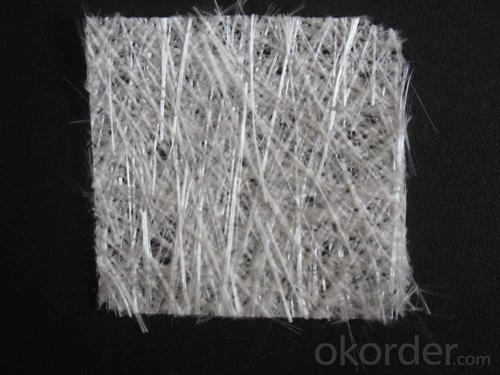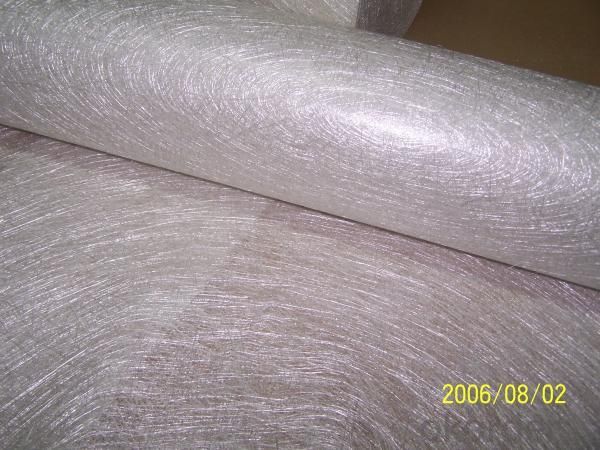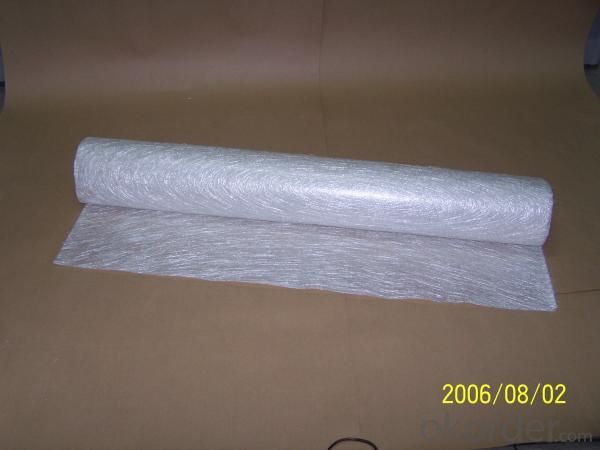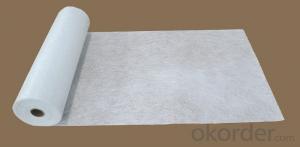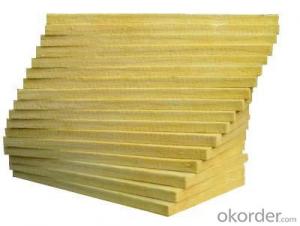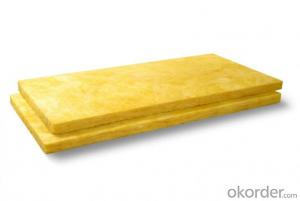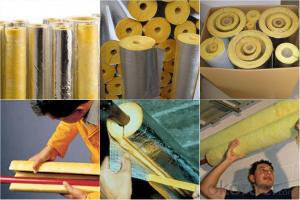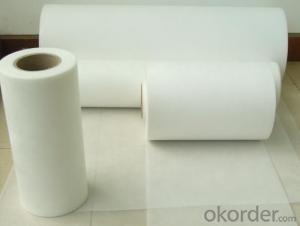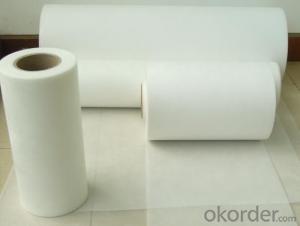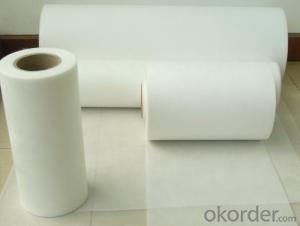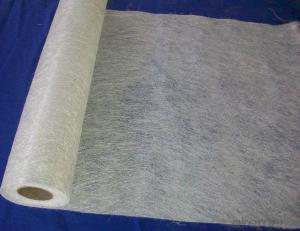Fiberglass Mat Tissue E-Glass CSM
- Loading Port:
- China Main Port
- Payment Terms:
- TT or LC
- Min Order Qty:
- 20Ton kg
- Supply Capability:
- 600TON PER MONTH kg/month
OKorder Service Pledge
OKorder Financial Service
You Might Also Like
Introduction of E-glass CSM
Type of glass: E-glass
Chopped Strand Mat is a mat with different GSM which made of fiberglass chopped strands with 50mm adding powder or emulsion binder. It is raw material to produce FRP products.
Specification of E-glass CSM
Width: 1m, 1.04m, 1.25m, 1.27m, 1.86m, 2m, 2.6m, 3m, 3.2m
Density:100g/m2, 200g/m2, 225g/m2, 300g/m2, 375g/m2, 450g/m2, 600g/m2, 900g/m2
Weight per roll depending on the different width:30kg, 35kg, 40kg, 45kg, 70kg, 80kg
Package of E-glass CSM
Packing:One 20' container can load about 10tons;One 40' HC can load about 23tons.
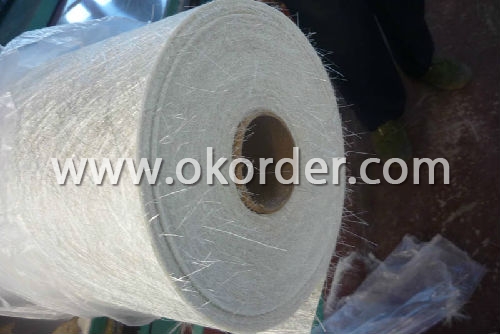
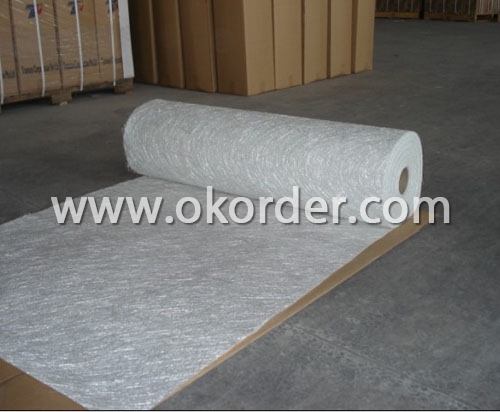
- Q: What are the factors that affect the diameter of electrospun nanofibers?
- Twist, twist, break, watch your strength, wave shape
- Q: Can fiberglass mat tissue be used for insulating concrete forms (ICFs)?
- Yes, fiberglass mat tissue can be used for insulating concrete forms (ICFs). It is commonly used as a reinforcement material in ICF construction due to its excellent insulation properties and ability to improve the overall strength and durability of the concrete structure.
- Q: Can fiberglass mat tissue be used for insulation in commercial buildings?
- Fiberglass mat tissue can indeed be used for insulation in commercial buildings. Fiberglass is a commonly used insulation material due to its excellent thermal performance, durability, and cost-effectiveness. Fiberglass mat tissue is typically made from fine glass fibers that are bonded together using a resin. This mat can be applied to walls, ceilings, and other surfaces to improve the building's energy efficiency by minimizing heat transfer. In commercial buildings, proper insulation is crucial for maintaining a comfortable indoor environment and reducing energy consumption. Fiberglass mat tissue offers several advantages for insulation purposes. It has low thermal conductivity, meaning it can effectively resist heat flow and reduce heat loss or gain through the building envelope. This results in lower energy bills and improved temperature control. Additionally, fiberglass mat tissue is lightweight and easy to install, making it a convenient choice for commercial buildings. It can be easily cut and shaped to fit around obstacles, ensuring a tight seal and preventing air leakage. This helps to further enhance the insulation's effectiveness. Furthermore, fiberglass mat tissue is non-combustible, providing an added safety benefit in commercial buildings where fire protection is crucial. It does not contribute to the spread of flames, and its fire resistance properties can help contain fires and provide valuable escape time in case of emergencies. Overall, fiberglass mat tissue is a suitable and widely used insulation material for commercial buildings. Its thermal performance, ease of installation, and fire resistance make it a reliable choice for achieving energy efficiency and comfort in commercial spaces.
- Q: Does anyone know the hardness value of the heat conductive gasket? Does it contain the hardness of the carrier (glass fiber)?
- The purpose of glass fiber is to make the product more convenient for processing, containing a layer of glass fiber cloth, then the operation process is not easy to damage thermal conductive gasket
- Q: What is the flexibility of fiberglass mat tissue?
- The flexibility of fiberglass mat tissue refers to its ability to bend, conform, or mold to different shapes or surfaces without breaking or losing its structural integrity. The unique properties of fiberglass, such as its high strength-to-weight ratio and dimensional stability, allow the mat tissue to be flexible while still maintaining its strength and durability. This flexibility makes fiberglass mat tissue a versatile material that can be used in a wide range of applications, including automotive parts, construction materials, and boat manufacturing. Additionally, the flexibility of fiberglass mat tissue enables it to be easily cut, shaped, or layered to meet specific design requirements or fit into complex or curved surfaces.
- Q: How does fiberglass mat tissue compare to other types of reinforcement materials?
- Fiberglass mat tissue, widely utilized in industries such as construction, automotive, and marine, serves as a common type of reinforcement material. When evaluating fiberglass mat tissue in comparison to other reinforcement materials, several factors come into play. First and foremost, fiberglass mat tissue exhibits remarkable strength and durability. With its high tensile strength, it can endure substantial pulling or stretching forces without distorting or breaking. This strength is comparable, if not superior, to reinforcement materials like carbon fiber or aramid fibers. Furthermore, fiberglass mat tissue displays excellent resistance to chemical, moisture, and UV degradation, rendering it suitable for long-term usage in various environments. Another advantage of fiberglass mat tissue lies in its cost-effectiveness. In contrast to other reinforcement materials, fiberglass is relatively affordable, making it a popular choice for manufacturers and builders who require a cost-efficient solution without compromising quality. Its affordability expands its accessibility to a wider array of applications and industries. Moreover, fiberglass mat tissue is renowned for its versatility. It can be molded into different shapes and sizes, allowing for customization and flexibility in design. This adaptability makes fiberglass mat tissue suitable for a broad range of applications, ranging from simple repairs to complex structural reinforcements. However, it is important to note that fiberglass mat tissue may have certain limitations when compared to other reinforcement materials. For instance, it may not possess the same level of stiffness or strength as carbon fiber, which is often preferred in high-performance applications. Additionally, fiberglass mat tissue may exhibit lower resistance to impact or fatigue when compared to materials like aramid fibers. In conclusion, fiberglass mat tissue provides a favorable combination of strength, durability, cost-effectiveness, and versatility, making it a favored choice for numerous applications. While it may have some limitations when compared to other reinforcement materials, its overall performance and affordability render it a widely utilized and dependable option in various industries.
- Q: Is fiberglass mat tissue suitable for construction applications?
- Yes, fiberglass mat tissue is suitable for construction applications. Fiberglass mat tissue is a versatile material that is commonly used in construction due to its strength, durability, and resistance to various environmental factors. It is often used in applications such as roofing, flooring, insulation, and wall panels. Fiberglass mat tissue is an excellent choice for construction projects because it provides reinforcement and stability to various materials. It adds strength to roofing materials, making them more resistant to impact, weathering, and fire. Similarly, it enhances the strength and durability of flooring systems, making them capable of withstanding heavy loads and foot traffic. Additionally, fiberglass mat tissue is an effective insulation material. It can be used to insulate walls, ceilings, and floors, helping to maintain a comfortable indoor temperature while reducing energy consumption. Its thermal and acoustic insulation properties make it an ideal choice for construction applications. Moreover, fiberglass mat tissue is resistant to moisture, chemicals, and corrosion, which makes it suitable for use in areas with high humidity or exposure to harsh chemicals. It does not rot or decay, making it a long-lasting option for construction projects. In conclusion, fiberglass mat tissue is well-suited for construction applications due to its strength, durability, insulation properties, and resistance to various environmental factors. Its versatility and reliability make it a popular choice in the construction industry.
- Q: Can fiberglass mat tissue be used for insulating metal buildings?
- Yes, fiberglass mat tissue can be used for insulating metal buildings. It is a commonly used insulation material due to its excellent thermal properties and ability to resist heat transfer.
- Q: What are the different types of fiberglass mat tissue available in the market?
- There are several types of fiberglass mat tissue available in the market, including chopped strand mat (CSM), continuous filament mat (CFM), and surfacing mat. Chopped strand mat is made up of randomly oriented short glass fibers held together with a binder, providing good strength and conformability. Continuous filament mat consists of long continuous glass fibers, providing higher strength and stiffness. Surfacing mat, on the other hand, is a thin layer of fiberglass mat used to improve the surface finish and appearance of the final product.
- Q: Can fiberglass mat tissue be used for repairing fiberglass truck beds?
- Yes, fiberglass mat tissue can be used for repairing fiberglass truck beds. It is commonly used in such repairs due to its strength, durability, and ability to bond well with the existing fiberglass surface.
1. Manufacturer Overview
| Location | Zhejiang, China |
| Year Established | 1969 |
| Annual Output Value | Above US$ 150 Million |
| Main Markets | overseas companies in Hongkong, Canada, South Africa, South Korea, India, Italy, Singapore, France and many other countries and regions. |
| Company Certifications | ISO9001;ISO14001 |
2. Manufacturer Certificates
| a) Certification Name | |
| Range | |
| Reference | |
| Validity Period |
3. Manufacturer Capability
| a) Trade Capacity | |
| Nearest Port | Shanghai |
| Export Percentage | 40%-50% |
| No.of Employees in Trade Department | 21-50 People |
| Language Spoken: | English |
| b) Factory Information | |
| Factory Size: | Above 5000,000 square meters |
| No. of Production Lines | Above 5 |
| Contract Manufacturing | |
| Product Price Range | Average |
Send your message to us
Fiberglass Mat Tissue E-Glass CSM
- Loading Port:
- China Main Port
- Payment Terms:
- TT or LC
- Min Order Qty:
- 20Ton kg
- Supply Capability:
- 600TON PER MONTH kg/month
OKorder Service Pledge
OKorder Financial Service
Similar products
Hot products
Hot Searches
Related keywords



